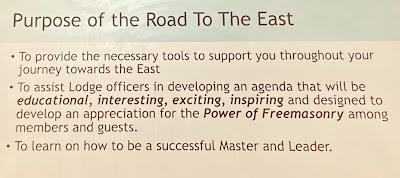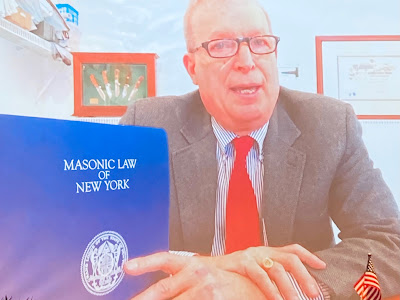A productive and eventful meeting of New Jersey Lodge of Masonic Research and Education 1786 yesterday morning. I can’t even complain about the commute, which passed without much aggravation—a singular occurrence! Two very engaging papers were presented, both of which successfully threaded the needle of speculative theses supported by research.
Before all that, though, was a lengthy conversation in support of an initiative unique to New Jersey Freemasonry. For several years, brethren of the research lodge, acting independently, have been memorializing John Skene, the seventeenth century Scottish Mason from the lodge in Aberdeen, who emigrated to West Jersey in 1682, becoming the first Mason in the New World. (Click here to learn about the first such event in 2022.)
Last year, the Skene celebration matured into an academic conference (click here). This year, the conference will continue, and the call for papers went out just days ago. From the publicity:
Conference Theme: The Scottish Enlightenment
Date: Saturday, August 24
Location: Crescent Shriners, 700 Highland Dr., Westampton, New Jersey
Submission via email: click here Subject Fields: American History/Studies; Atlantic History/Studies; British History/Studies; Cultural History/Studies; Humanities; Immigration & Migration History/Studies; Intellectual History; Philosophy; Religious Studies and Theology; Social History/Studies
Call for Papers: John Skene, the conference’s namesake and first known Freemason in the New World, arrived at a time of great intellectual change. The 2024 John Skene Masonic Conference theme is “The Scottish Enlightenment” and seeks to investigate the links between the Scottish Enlightenment, the Atlantic World, the American Revolution, and the Enlightenment more broadly. With the 1707 Acts of Union, Scottish elites followed the power to London, leaving space for the emerging middle class to take the cultural, political, and social reins. The intellectual movement that resulted included key concepts that would come to have an underappreciated impact on the modern world. Key to understanding this is the concurrent growth of Freemasonry, emerging in 1717 as English Freemasons established the first Grand Lodge.
Deadline: Friday, May 3.
Our annual conference seeks to explore the ways in which the Enlightenment in Scotland brought new ideas to the forefront and expanded the movement more broadly. Freemasonry’s concurrent expansion provided a network that shared a common cultural and intellectual lineage. How did these two movements interact? How did the Enlightenment in Scotland spread during the Scottish diaspora? And how did Freemasonry draw from Scottish intellectual roots to become a center of cosmopolitan colonial life in British North America?
Specifically we are looking for proposals that will fit into panels on:
▸ The Scottish Enlightenment
▸ The Scottish Enlightenment in America
▸ The Enlightenment in America
 |
| Magpie file photo |
With this broad theme we hope to explore the connections between the Enlightenment and Freemasonry, and the Scottish Enlightenment as a specific movement spread by the Scottish diaspora. While papers dealing directly with Freemasonry are encouraged, the committee is seeking out speakers on broad topics of the Enlightenment in these contexts, particularly if the papers touch on prominent Masons/Masonic Lodges/networks.
Papers may be published in a possible joint volume of conference transactions.
The committee is looking for broad/introductory research on the following areas: Scottish Enlightenment, the Scottish Enlightenment in America, New Jersey and the Enlightenment.
Conference Mission: The John Skene Masonic Conference is an annual event crossover conversation between Masons and those who study our gentle craft. Held in commemoration of John Skene, the first known Freemason in the New World, who settled in West Jersey at the end of the seventeenth century. Along with a memorial held at Peachfield, his plantation home outside Burlington, New Jersey, the conference aims to serve as an annual venue for research and conversation on the broader historical role Freemasonry has played within the New Jersey, colonial, American, and Atlantic contexts.
Regarding publication of the papers presented, part of the long conversation at our meeting yesterday culminated in the agreement to share these papers in the lodge’s book of transactions. In fact, the research lodge will serve as a sponsor of the August 24 event to help clear the legal, financial, etc. hurdles of organizing a complicated day. Of course, The Magpie Mason will keep you updated, including a notice when tickets go on sale.
But about the research lodge meeting: Bro. Glenn presented The Meaning of the Three Ruffians, which explored psychological, etymological, and other facets of the identities of You Know Who. Bro. Howard returned to the lectern in his usual style with Who Was the Widow’s Son? A Discourse on Confusion, which also delved into word origins, plus Biblical and ancient histories, excursions to Greece and Graceland, and even a mention of Groucho Marx. Well done!







































































































